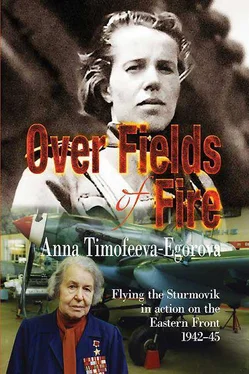Masha remembered how on the first bath day all the girls, like all the other soldiers, were issued with high-collared tunics and trousers. They had to make them over and adjust themselves individually. Nina Gneusheva — a modest, very pretty and proud girl born in Kuban — became our seamstress. On finding out about Nina’s talent, the male pilots, blushing and hesitant, began to ask her for makeovers, sometimes of their blouses, sometimes of trousers or something else. The Kuban Cossack girl managed to do everything, to hang bombs and rockets, to load cannons, and to carry out all tailoring orders.
The female gunsmith/armament specialists were issued English-made boots, which were nicknamed ‘Churchills’ — for their thick soles. They were issued together with puttees out of which the girls learned to make stockings. The latter had their ‘brand-name’ — zebras. The homemade stockings were so called for their low-quality dyeing — in stripes. Some would manage to procure acrichine from the regimental surgeon or ink from Ivanovskiy’s HQ administration department, dilute it with water and dip the puttees in it — and rush to wring them out, because the others wanted to dye their own ones. In the summertime the armament specialists did not wear cumbersome ‘Churchills’. Instead, they were making a splash wearing slippers self-made from plane covers. Guard duty was the only duty they served fully uniformed…
Guard duty deserves special mention. Standing guard was what frightened the girls most. It was especially hard in the territory of Poland and Germany: there, you had to watch out, to twirl your neck all the time! And as ill luck would have it, the Starshina Shkitin would place girls as sentries at the most remote guard-posts. He reckoned they would be the most vigilant sentinels guarding the aerodrome. Indeed, our beautiful armourers knew well how to handle submachine-guns and the strict Starshina trusted them with good reason.
Once Yulia Panina came to a meeting of the regiment Comsomol bureau, of which she was a member, with a bandaged neck. “What’s wrong with you, Yulia? Are you sick?” The bureau secretary Vasya Rimskiy asked.
“No”, Yulia replied, “I’m not sick. But I was on a guard duty last night. With fear, I turned my neck so much that I have hurt it…”
“Are you joking, Panina?”
“Not at all. It seemed to me all night that someone was crawling towards the planes and I was straining my ears and eyes so much that… now it hurts.” Everyone laughed.
“Everything will close up on the wedding day!” Zhenya Berdnikov concluded joyfully.
“You may well laugh. You’re the sterner sex but I often see you standing guard by the headquarters dugout. But we — the fair sex — stand with our machine-guns by night at the outermost plane parks…”
Generally speaking, the regimental and squadron Comsomol meetings usually occurred between combat sorties or in non-flying weather, late in the night. The agendas were such as: “All our strength for the destruction of the Fascist beast!”, “Strike at the enemy like the Comsomol crews of the Heroes of the Soviet Union Rykhlin and Efremenko!”, “Mutual help in combat is the Comsomol member’s law!”
Once, the pilot Bougrov came back from a sortie in plane so damaged, that it would have been better to tow it to a scrap-heap: such holes yawned on its wings and fuselage that a man might have easily fallen through many of them, while the rudders and elevators were barely holding on. After having a look at the machine, the regimental Chief Engineer Koudelin addressed Bougrov: “Tolya, my boy! I am an old aviation engineer. I’ve seen a lot in my life but I’ve never seen anything like that. Not only were you flying a wreck not a plane, but what’s more you’ve landed it brilliantly! Honour and praises to you!” And straightaway Koudelin addressed this subordinates. “Shall we try it, guys? Shall we fix it up?”
This appeal by the Chief Engineer played a positive role. The impossible was done — in a week the pilot Bougrov took off in that plane to strike at the enemy. Everyone knew that every repaired plane, its every sortie, meant death for dozens of Fascists!
But in the tension of combat work my regimental comrades nevertheless knew how to find time for relaxation and rest. The aerial gunner Zhenya Berdnikov was an indefatigable and constant organizer of regimental amateur performances. A merry fellow and a live wire, he could tell all sort of cock-and-bull stories and jokes for hours. And when, goggling his eyes and turning his toes out sideways, Zhenya began to dance imitating Chaplin and singing songs from his movies, it was simply impossible to keep from laughing!
Once, Berdnikov suggested putting on stage in the Stanitsa Timashevskaya’s club a sketch of Leonid Lench’s 135 135 Translator’s note — a Soviet playwright.
called ‘The Dream Comes True’. Most of the roles were taken willingly by the amateur performers, but no one wanted to act as the demoniacal Führer . Finally the Comsomol organizer Rimskiy had to accept it. The staging went off successfully, and then it was decided to show it to the locals. The concert in the club went well. The mechanic Vanya Koulikov danced the ‘Yablochko’ 136 136 Editor’s note — ‘The apple’, a then-famous folk dance.
, then, together with the female armourers Nina Piyuk and Dousya Nazarkina, ‘The Russian Folkdance’. Masha Zhitnyak and Vasya Nazarov read aloud humorous stories, and Berdnikov and Panina sang the ‘Ogonyok’ song to the accompaniment of the flyer Pavel Evteev. Everybody liked how Vadim Morozov recited the poem ‘Wait for Me’ 137 137 Translator’s note — one of the most famous and emotional wartime poems in the USSR.
. Then the sketch ‘The Dream Comes True’ began, but at the moment of conversation between Napoleon and Hitler loud cursing resounded through the complete silence, and some object flew across onto the stage and accurately hit ‘Hitler’. The club audience burst out laughing but the actor didn’t feel like laughing: he’d got a good smack from a gumboot. Apart from that, his wig with its renowned forelock on his narrow forehead flew off his head.
After that incident the sketch was not performed anymore: no one wanted to play the despicable person! And when after the concert a very old man came up to Rimskiy and began to apologize: “My boy! Forgive me, I didn’t mean to hurt you. I’d strangle Hitler with my own hands! The Fascists shot my two brothers, burned my house down…” How could we not sympathize with this human grief…
On 16 September 1943 our troops liberated Novorossiysk, on 9 October the Choushka Spit was cleared of Fascists and troops were landed North of Kerch on the Enikale Peninsula. Troops also landed near Eltigen. On the maps there is no such a place as Eltigen now, but there is a place named Geroiskoye (‘Heroic’). And back then, when on the night of 1 November 1943 huge waves were violently smashing the rocky cliffs, the fearless landing party went ashore there. They were to sail thirty-odd kilometres across the tempestuous Kerch Straits in unseaworthy tubs. Thirty-odd kilometres under endless artillery barrage, under the beams of searchlights…
We airmen knew nothing about the Eltigen landing. The weather prevented flying and all our field aerodromes had become slushy. There were several attempts to take off but nobody had any success: the Ils’ undercarriage went into the mud up to the wheel hubs. We managed to join the combat only on November 7.
The group was led then by the regimental navigator Major Karev. During the briefing before take off he instructed us: not to brake during the run-up — otherwise the six-ton Sturmovik would bog down, bury itself in the mud, and might turn over. The undercarriage might not retract for it would be jammed with mud and, even if retracted, might not extend before landing — the mud would suck it back. In that case one would have to lower the undercarriage with the emergency winch, making 32 turns with the right hand, while controlling the plane with the left. Karev warned that we would all would have to take off with the oil cooler’s shield shut, and open it immediately after take-off, or the mud would block the cooler’s cells, the engine would cook and break down.
Читать дальше












